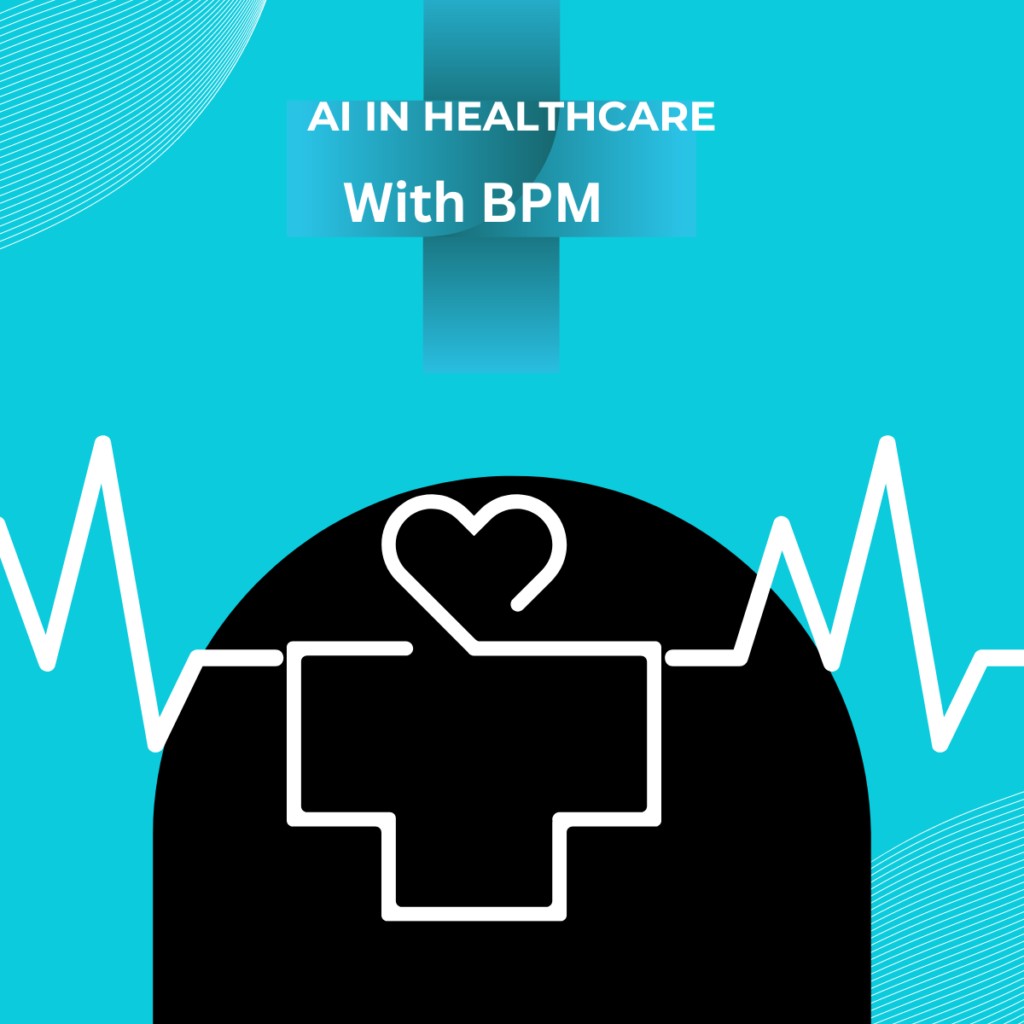
AI in Healthcare
How is AI-enabled Business Process Management Beneficial in the Healthcare Domain?
AI in the healthcare industry is an outstanding innovation. Do you want to know why? Because with the advent of artificial intelligence (AI), there has been a considerable shift in healthcare. You might be wondering, how is this even possible? Well, you came to the right platform.

AI-enabled Business Process Management (BPM) is making this change to create effective and patient-focused healthcare. If you don’t want to miss out on an amazing opportunity about AI in healthcare, you must gain knowledge about it. Let’s learn one by one. To learn how AI in healthcare services enables business process management, follow the rest of the blog.
The Role of AI in BPM
Well, where shall we begin to talk about AI in BPM? To begin with, AI brings numerous advantages to BPM. Firstly, AI can analyze vast amounts of data quickly. This capability helps identify patterns and predict outcomes, which is crucial in healthcare.
Secondly, AI can take care of routine tasks. This frees up healthcare professionals to focus on patient care. Lastly, AI-enabled BPM enhances decision-making by providing real-time insights and recommendations. As we can see, we absolutely can’t ignore the impact of AI in healthcare.
Benefits of AI-enabled BPM in Healthcare
Although the helpfulness of AI-enabled BPM is huge; it would be impossible to list all of them. But, we can try to understand the focused area of functions. No wonder, why there are so many benefits. AI discloses enormous potential of possibilities. Let’s figure this out together.
Patient Care Improvement
One of the primary benefits of AI-enabled BPM in Healthcare is the improvement of patient care. AI can analyze patient data to provide personalized treatment plans. For example, AI algorithms can predict which patients are at risk of developing certain conditions. This allows for early intervention and better management of chronic diseases. Additionally, AI can help in monitoring patients in real-time
Moreover, AI can integrate data from laboratory results, and imaging studies. It provides a comprehensive view of a patient’s health. As a result, healthcare providers can make more informed decisions.
Fastest Administrative Process
No matter, how hard we try, more than digital and analog systems are needed to save the data. Why? Because they can’t run the algorithm and make decisions based on that. Think about saving 10,000 data and then you need to go through each one individually to create a summary.
Or you need to find a similar pattern of a disease based on the last 10 years’ case studies. Can you imagine the burden one needs to go through for this task? Thanks to business process management that helps in structuring administrative processes.
Improved Clinical Decision-Making
AI-enabled BPM helps in clinical decision-making. As an input, if you add clinical then it gives output as evidence-based recommendations. This leads to better patient outcomes and more accurate diagnoses, especially in emergencies.
Analogous to the above example, AI systems analyze data from emergency calls and prioritize cases based on severity. This verifies that patients receive timely and appropriate care. Furthermore, with the help of BPM, AI can support clinical trials by identifying suitable candidates. It accelerates the development of new treatments and therapies.
Data Security and Privacy
If we talk about online digital services, we can’t go on without talking about data security and privacy. Providing utmost importance to Data Security and Privacy in The AI Healthcare field not only values user engagement but also improves it.
The reason is pretty simple. If the user of the service wants to share their private data with you, they want assurance of privacy. They never want any temperament with their data. With the increasing use of digital tools in healthcare, data security and privacy have become major concerns.
As has been noted, AI can monitor compliance and ensure that all processes meet regulatory standards. This reduces the risk of legal issues and enhances patient trust. Additionally, AI can help in managing access to sensitive information. It also allows only authorized personnel to access certain data.
Personalized Treatment Plans
Concurrently, Finance Management in Health Care is also necessary as it is no joke. All you want is a treatment without breaking your bank. To reduce these issues, AI-enabled BPM can consider things. It will help to create personalized treatment plans all over the country, even the globe! So, what are you waiting for?
AI can use patient data to tailor treatment plans to individual needs. This personalized approach enhances the effectiveness of treatments and patient satisfaction.
Real-World Examples of AI in Healthcare With BPM
Now, let’s talk about some real-life scenarios. This will help you to get acquainted with the dominance of AI in healthcare. Many healthcare organizations are already using the benefits of AI-enabled BPM.
For example, Cleveland Clinic has implemented an AI-powered system to streamline its appointment scheduling process. To analyze patient data to predict the likelihood of appointment cancellations and no-shows, this system allows the clinic to optimize its scheduling and reduce waiting times.
In essence, the University of California, San Francisco (UCSF), uses AI to monitor patient vital signs in real-time. This system alerts healthcare providers to any significant changes. It enables them to intervene promptly and prevent complications.
Furthermore, the Mayo Clinic has adopted AI to support clinical decision-making. Their AI system analyzes patient data and provides recommendations for treatment plans. It works as an assistant, helping doctors make more informed decisions.
Challenges of AI in Healthcare Using BPM
We have discussed the amazing outcomes of introducing AI-enabled BPM in healthcare straightforward way. But, in reality, it is more complicated than it seems. At the end of the day, we need to understand they are only intelligent technology. And, technology always comes at a price. Either we need to spend our time or money on it.
Reports have been made about how brutally AI misguides young minds and professionals. So, the implementation of AI systems requires significant investment in technology and training. Lastly, there are concerns about data privacy and security. Healthcare organizations must implement robust measures to protect patient data from cyber threats.
Future of AI-enabled BPM in Healthcare
So, are we doomed? Is AI taking over the world? Are our data being tempered?
The short answer is yes. In a broader sense, no. pardon me if we are confusing you. By no means, that is our choice. Let me help you to understand this better.
Moreover, there is a need for ongoing research to improve AI algorithms. Undoubtedly, we can hope for better accuracy and reliability. Despite these challenges, the future of AI-enabled BPM in healthcare looks promising. Advances in AI technology and increased adoption of digital tools are likely to drive further improvements in healthcare delivery.
Conclusion
So, we can’t deny the challenges without acknowledging their potential. As technology continues to advance, the role of AI in healthcare will only grow, leading to better outcomes for patients and healthcare providers alike.
In summary, the integration of AI in BPM is not only just a technological advancement but also a significant step. So far we have guided you about the ups and downs of the AI-embedded BPM system in healthcare. Of course, the benefits are not all, and neither are their challenges. We have portrayed a clear picture in front of you. And, now we are questioning you, are you ready to take the new paths?




